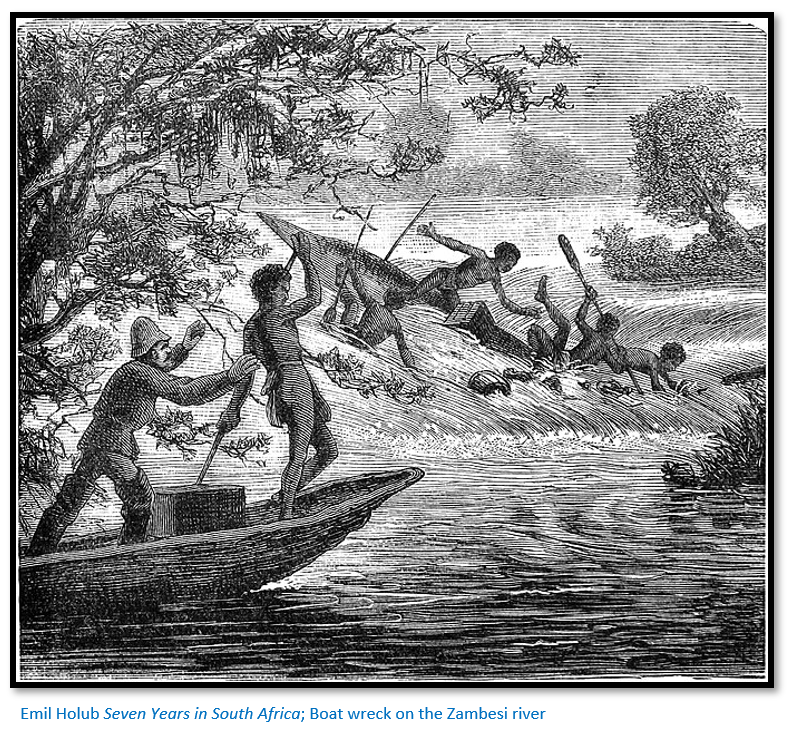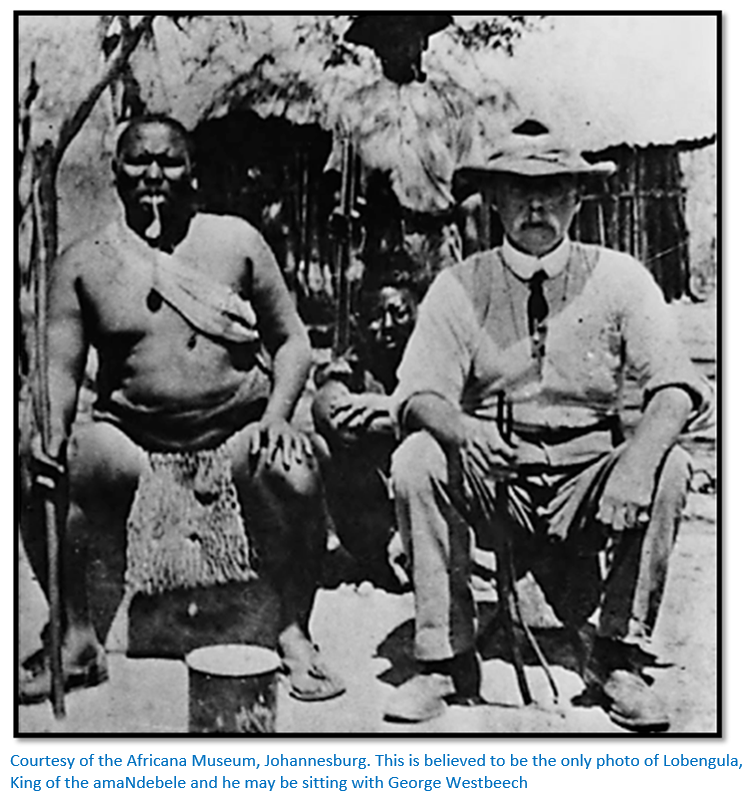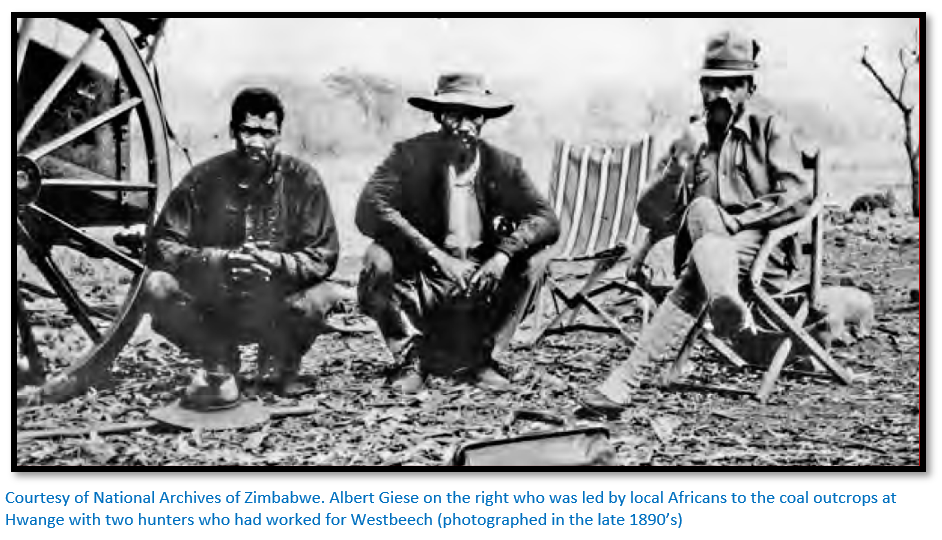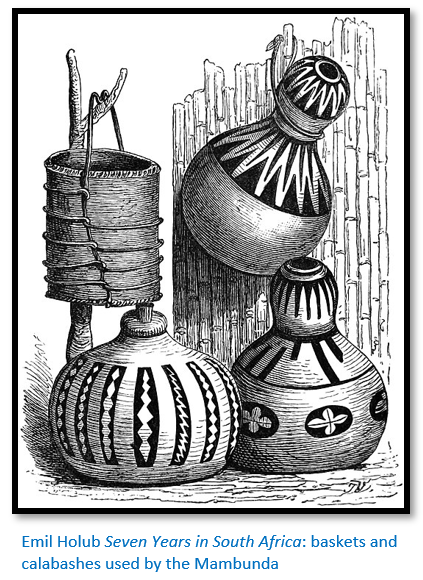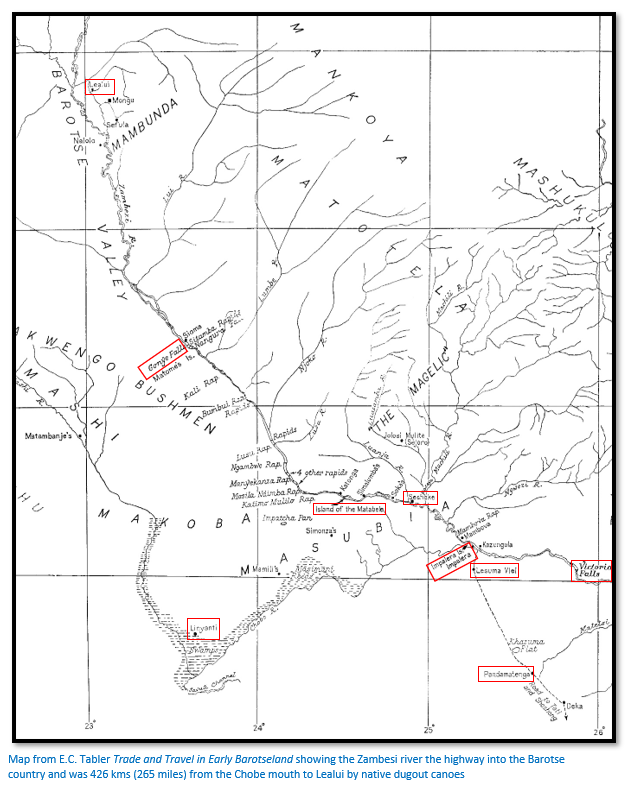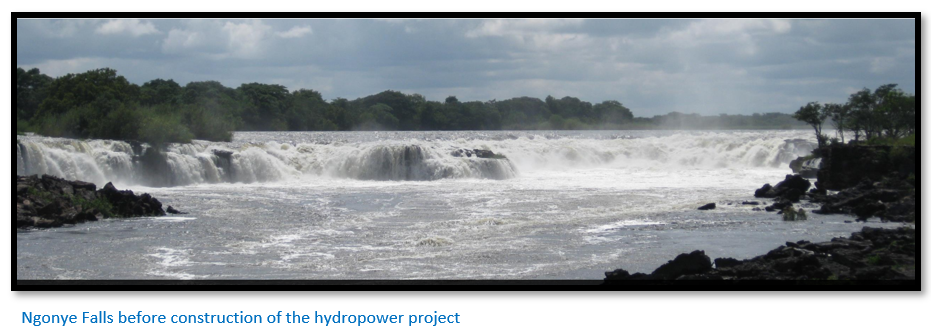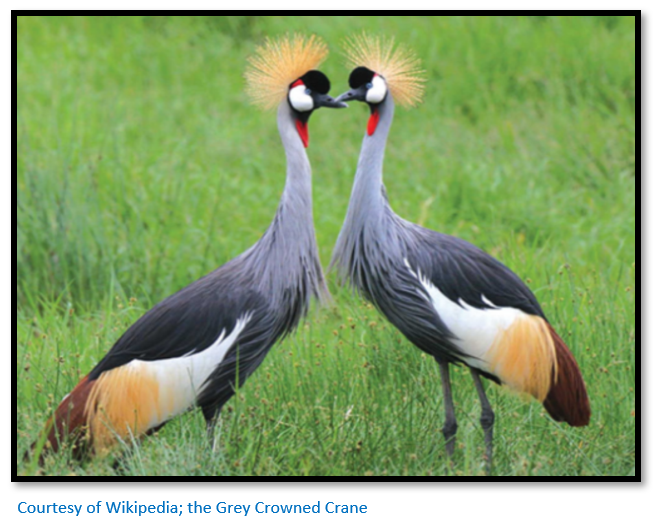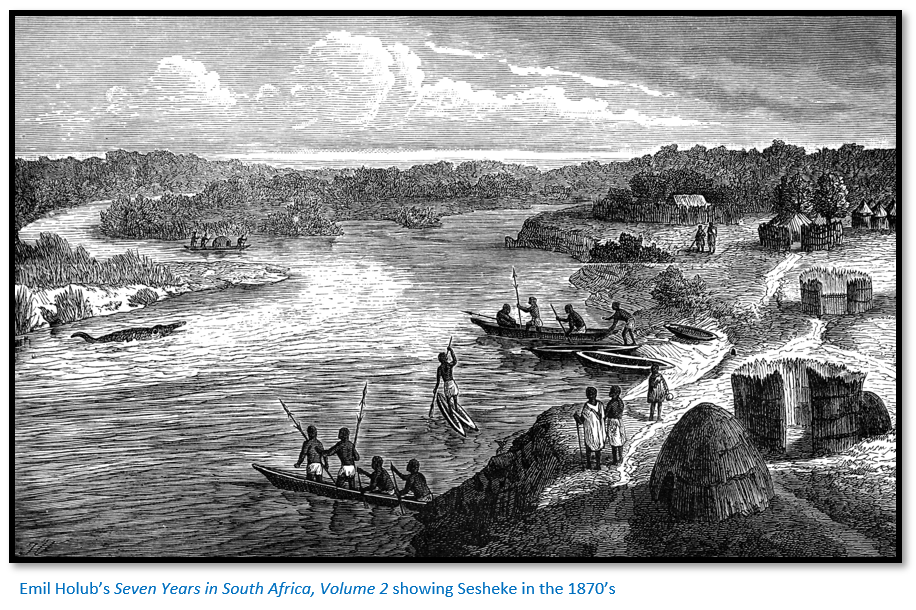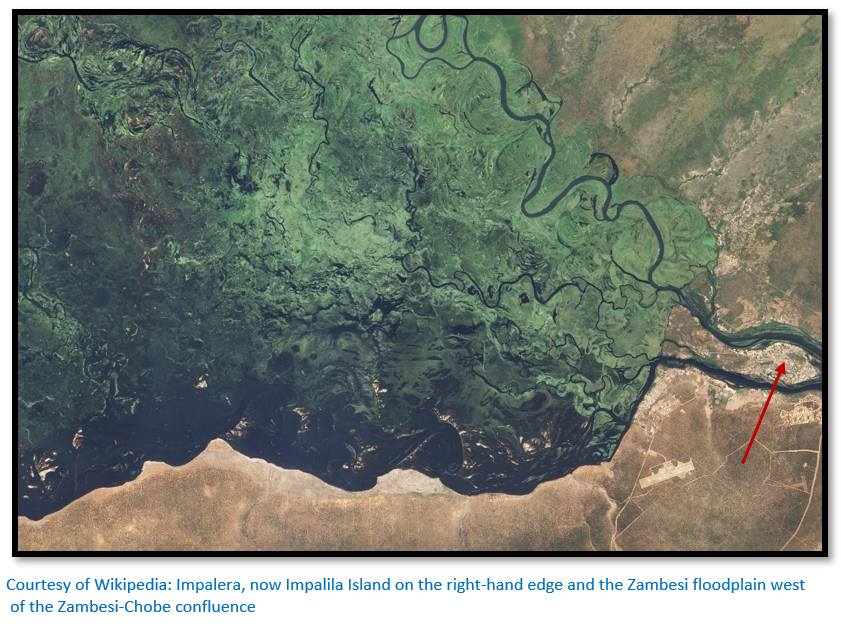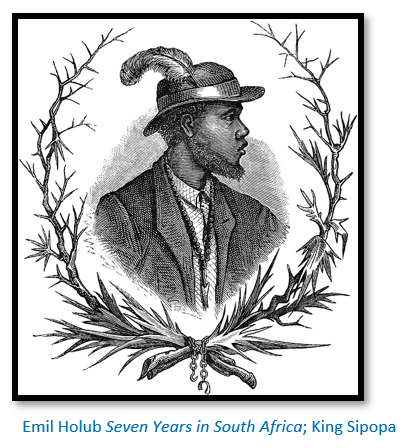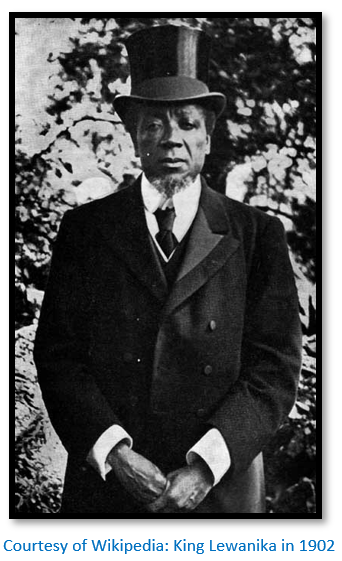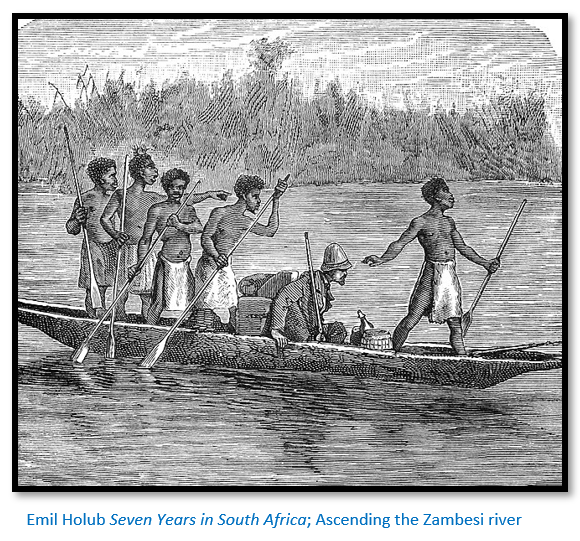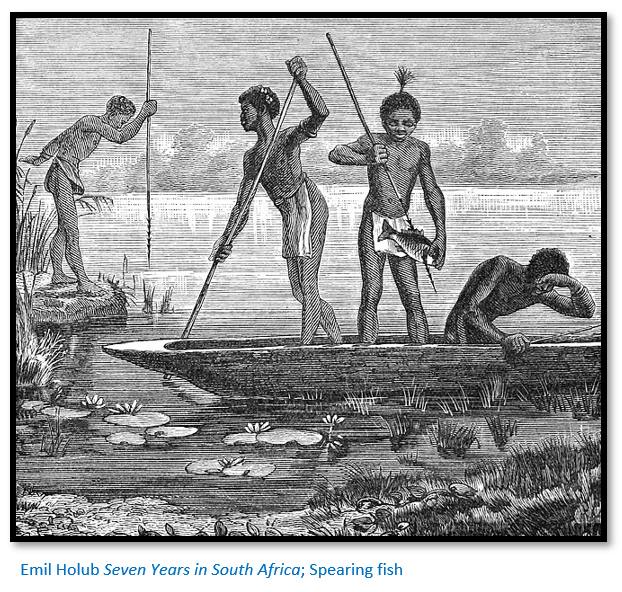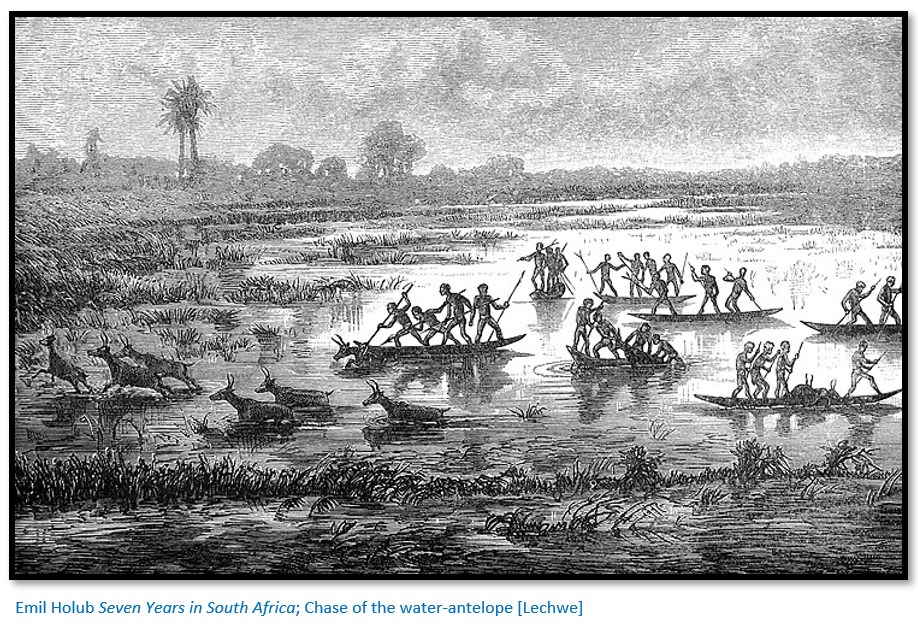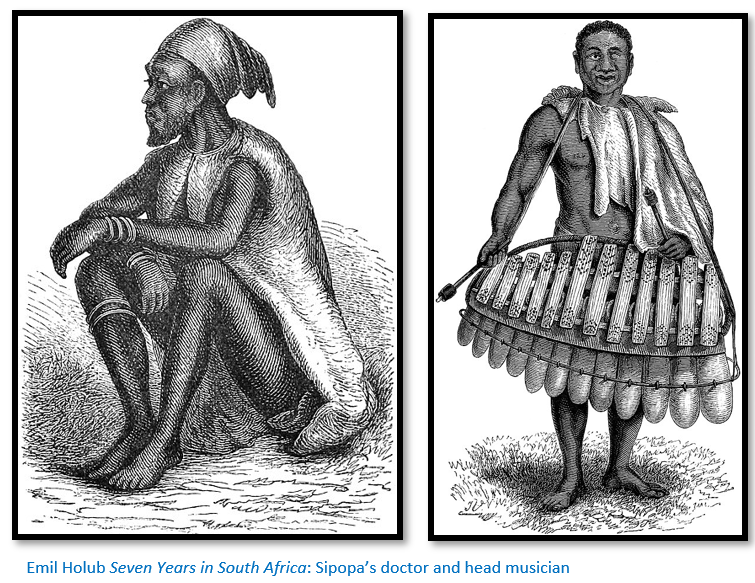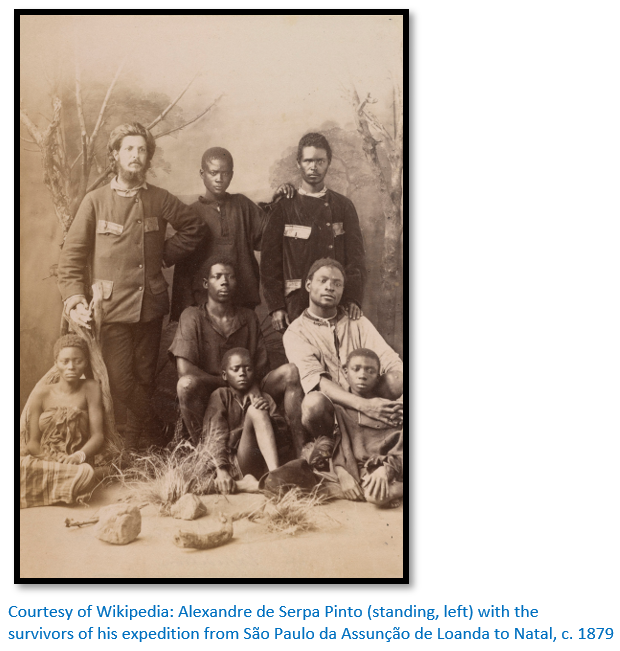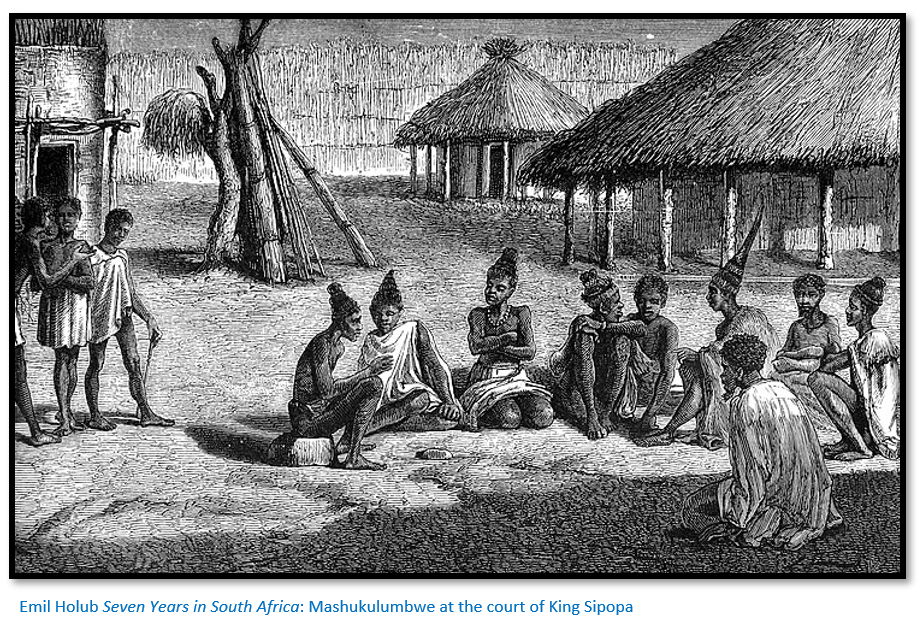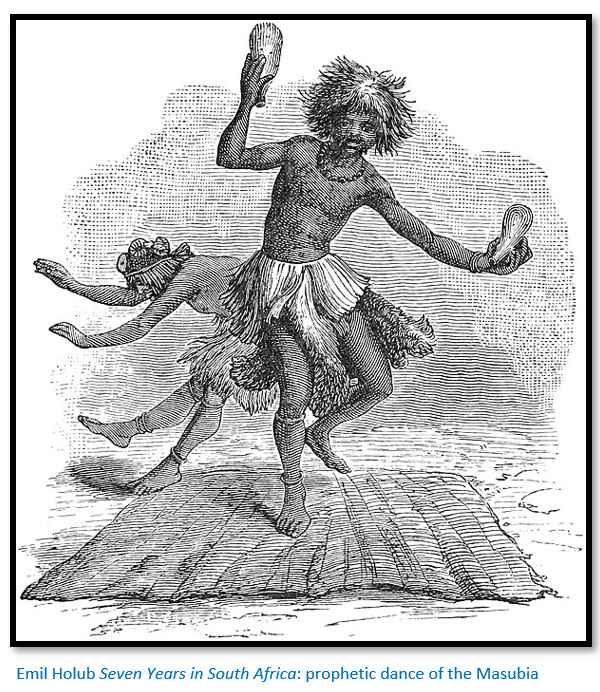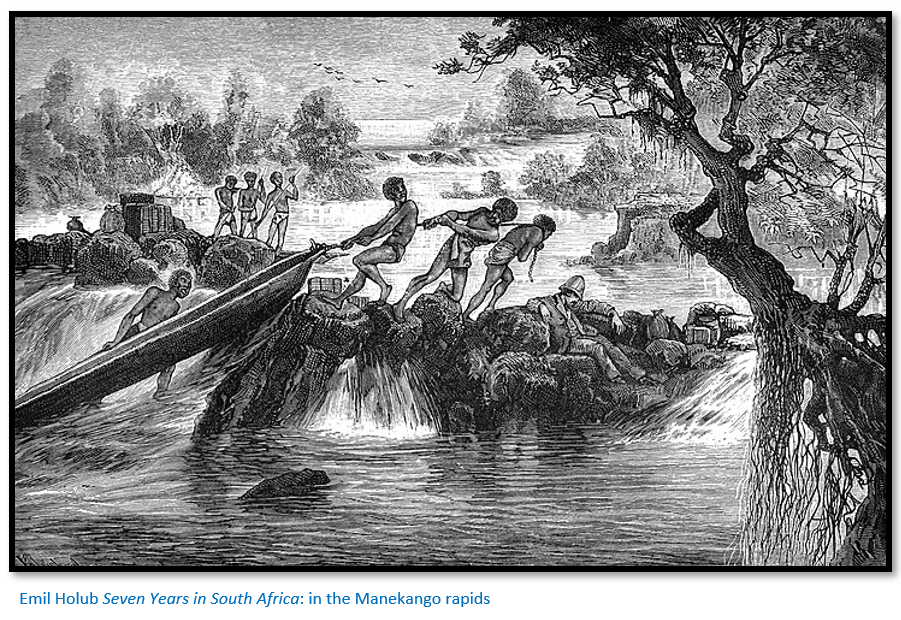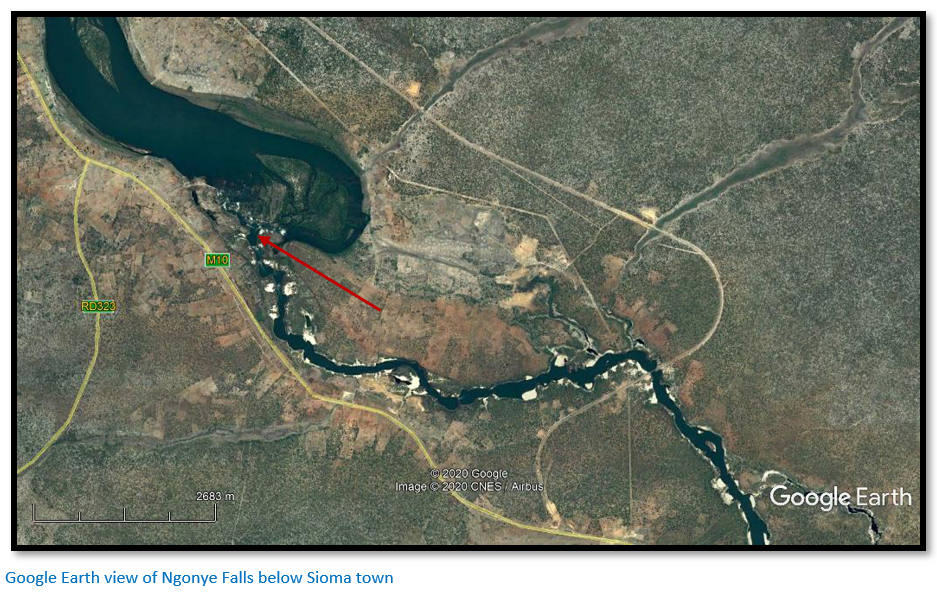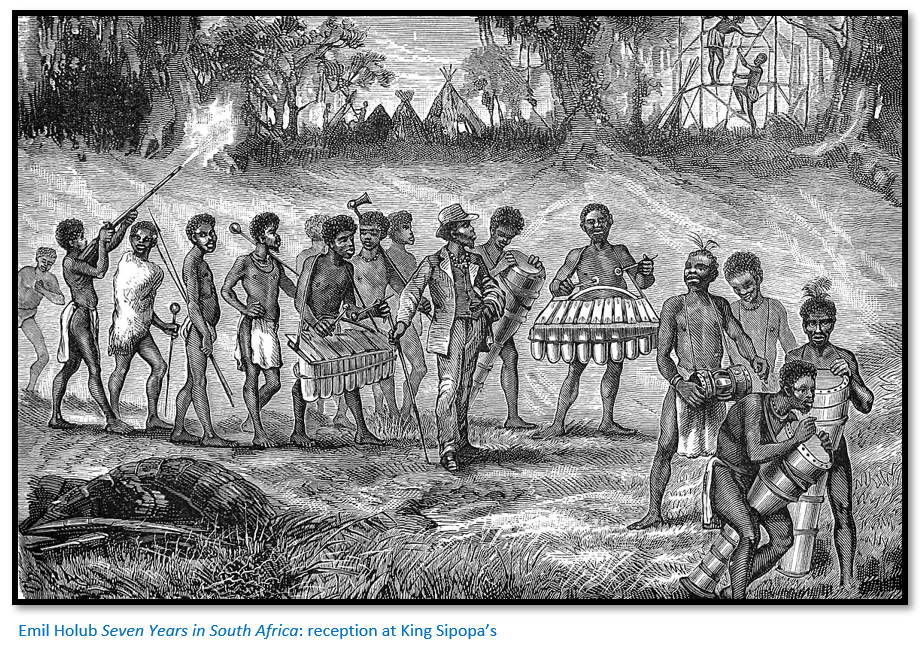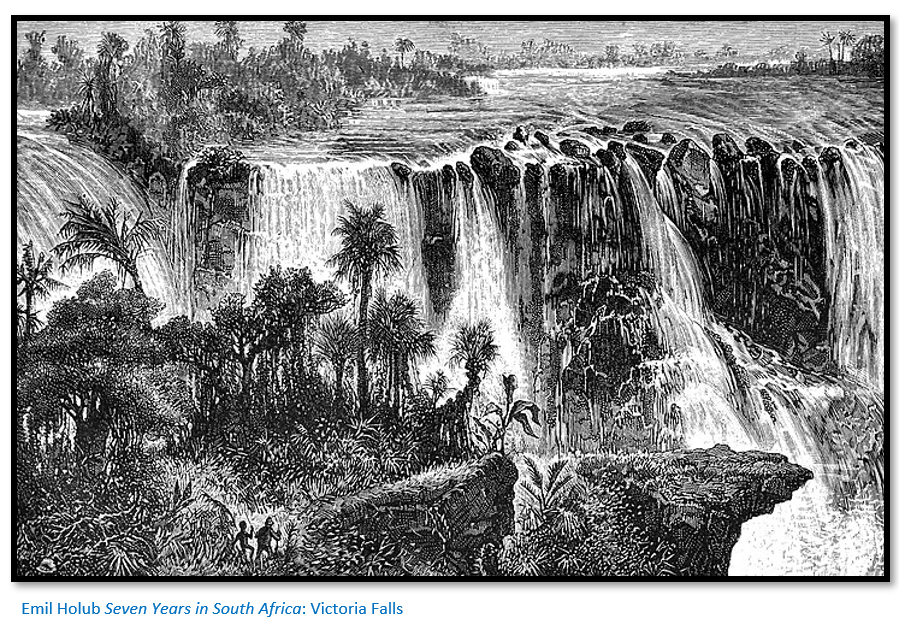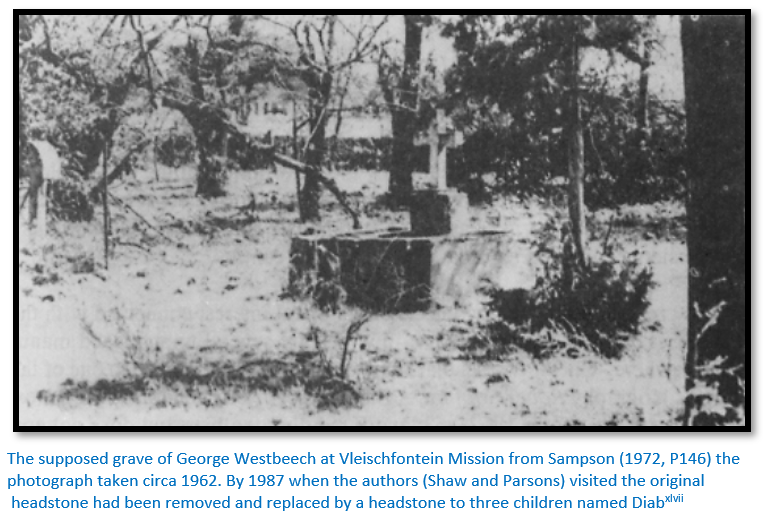Home >
Matabeleland North >
George ‘Joros’ Westbeech’s influence in the lower Zambesi Valley and his 1885-1888 diaries
George ‘Joros’ Westbeech’s influence in the lower Zambesi Valley and his 1885-1888 diaries
George Westbeech did keep a diary but sadly most of it has been lost except for those parts covering the period 1885 – 1888 which are covered in detail in Edward C. Tabler’s book Trade and Travel in Early Barotseland. They may have been lost in a boat upset on the Zambesi much as the illustration in Emil Holub demonstrates below. However many of his letters have been preserved and from them we learn of the turbulent events in Barotseland[i] at this time.
So what makes George Westbeech’s life one to remember
Tabler describes Westbeech as the “the man responsible for establishing a British foothold in Barotseland” although he was a trader and not a political agent or missionary.
Barotseland became the first territory north of the Zambezi to sign a minerals concession and protectorate agreement with the British South Africa Company and remained a British protectorate from 1890 to 1964.[ii]
Westbeech had only a very basic education but he was well-mannered and generous and helpful to all both African and European. He encouraged his employees George Blockley and Dr Benjamin Bradley to help all the travellers who came to Pandamatenga on their way to the Victoria Falls.
He must have had an iron constitution as he survived many rainy seasons and the worst of the malaria living on indifferent food and often exposed to the wet weather. By 1878 he had fever more than thirty times and joked that he never felt well without at least a touch of it.[iii]
His close and lasting relationships with King Sipopa and then Lewanika are easily explained. The King could not trust any of his people, but Westbeech they could trust absolutely as he always gave impartial advice and once given was trusted to keep his word. The Mambari and Portuguese mixed-race traders took active parts in the various conspiracies and could not be relied upon.
George Westbeech never interfered in politics and was able to work with all the chiefs and their indunas, but his trading did suffer during uncertain periods. Between 1879 – 1884 the sale of guns and ammunition outside of the Cape Colony was banned and Westbeech struggled to make a living.
Under King Lewanika, the price of elephant tusks had dramatically increased and he strictly controlled any elephant hunting. This too contributed to the sad state of George Westbeech’s financial state.
Nobody doubted Westbeech’s honesty; his notes were accepted as payment for ivory and faithfully redeemed by his agents – thus establishing a credit system when there was no currency.
Westbeech was held in high esteem by Lobengula and with his great influence was able to halt the amaNdebele raids on Barotseland which greatly added to his reputation. Lobengula’s father Mzilikazi had sent up an amaNdebele impi in the 1840’s to subdue the Makololo and the Barotse, but pressed boatmen marooned them on an island where they starved and were then killed by their supposed victims.
Lobengula did send an amaNdebele impi against the Batauwani at Lake Ngami in 1883 when they captured many cattle and forced the people to hide in the swamps. The second raid in 1885 was a complete disaster as the Batauwani received news of the impending attack and took their cattle and people beyond the Botletle, now Boteti river and ambushed the amaNdebele with their breech-loading rifles. Many amaNdebele were shot, others drowned trying to cross the Botletle and the survivors were forced to retreat across 640 kms (400 miles) of uninhabited desert with hundreds dying of thirst, starvation and exhaustion.
Westbeech was fluent in Sesuto, Sindebele and Sechuana languages which allowed him to really understand the customs and thoughts of the people he lived amongst and they respected him for his understanding of their culture. He was made a member of the Barotse council of state and looked upon by all as the equal of their chiefs.
By outcompeting the Mambari and Portuguese traders he significantly reduced the slave trade and neutralised Portuguese influence in the region thus playing a prominent part in opening up the Zambesi Valley to European traders and missionaries.
His base at Pandamatenga was efficiently run by Dr Bradley with a postal service of African runners to Shoshong and his employees constantly maintained the roads to the south thus facilitating the transport of goods and people. In addition he established the first ferry regular crossing from Kazungula across to the Zambesi south bank by lashing canoes together which permitted ox-wagons to be transported across the river. With his hunters and their teams it is estimated that Westbeech’s operation employed around 400 people.
George Westbeech was remembered by all the travellers to Pandamatenga for his kindness and help he gave them. Emil Holub stayed with him on both visits to Barotseland in 1878 and 1885 and was greatly helped as described in the diaries after his attack by the Mashukulumbwe.
He also greatly assisted Francois Coillard who established a Protestant mission station at Lealui. Coillard first made his request for a mission station to King Sipopa in 1878; with Westbeech’s support Sipopa agreed and Coillard had returned to Europe to organise funds and supplies to set up the mission. It took Coillard 6 years before he could get back to the Zambezi and during that time the Jesuits arrived but Westbeech stalled their progress so that they set up a mission at Pandamatenga and not in Barotseland before leaving permanently for the Transvaal in December 1885.
Frederick Arnot, a British missionary, also arrived during Francois Coillard’s absence in 1880 and George Westbeech assisted him to live and work at Lealui. Arnot stayed at Lealui for two years teaching Lewanika’s children and greatly influencing his decisions. During that time Lobengula wrote to Lewanika suggesting an alliance, but Arnot persuaded Lewanika that an alliance with the British similar to that made with Chief Khama of the Bechuana people would be more advantageous to Barotseland.
Background summary history of Barotseland
The Makololo people according to Tabler[iv] had a government and political organisation which was far superior to their neighbours with an unwritten constitution and a good administration system. They had a King who was assisted by a council of advisers, including a position like a present-day prime minister called the Ngambela. Their country was divided into administrative districts each ruled by a provincial governor appointed by the King and reporting to him were village headmen.
The people were farmers and pastoralists with herds of cattle and were expert iron-smiths and woodworkers. They dominated the Zambesi river and their influence was felt, if not their rule, eastwards of the Victoria Falls from the Chobe river. Many surrounding tribes accepted their rule and were exempted paying tribute including the Mambunda who were the official magicians and excelled at basket work and weaving mats, the Masubia who lived on the Zambesi from Chobe mouth to Katonga village [see map below] and were boatmen, fishermen and potters and the Matotela who were known as boatbuilders and ironsmiths living between the Zambesi and Kafue rivers.
Those tribes paying tribute included the Mankoya who lived by hunting and gathering in the Luena and Luampa valleys and the Mashukulumbwe of the Kafue valley and the Mampukushu and Mashi on the Kwando river on the boundary of present-day Angola and Zambia.
It was at Linyati on the Chobe river in 1851 that William Cotton Oswell and David Livingstone made contact with the Makololo and travelled to Sesheke to meet Sebetwane whom the missionary described as strong and wise. Soon after he died of pneumonia and was succeeded by Sekeletu who became a great favourite of Livingstone and assisted him on his journey down the Zambesi river.
Sekeletu 1851 - 1863
But Sekeletu was weak and foolish, the former cohesion of the Makololo collapsed and when he died in 1863 an uncle Mbololo succeeded him as the last Makololo chief. However he was so cruel that when a rival claimant to the throne came forward he found much support and civil war broke out. Some Makololo defected to the amaNdebele and the Tawana and with the Kingdom in a weakened state the Barotse seized their chance to overthrow them.
Sipopa [Sepopa in Westbeech’s diaries] in the north sent his army against the Makololo and easily defeated them. Most Makololo males were killed or ran away, wives and children were integrated into the Barotse and their language was retained.[v] Sipopa made his position secure by having two of his three brothers killed and seized power as the new King in 1864 and this was the state of affairs when Westbeech and Blockley travelled to Impalera Island in 1871 with their three wagon loads of trade goods.
Trade in the Barotse Valley in the 1850’s
At the time of Cotton and Livingstone’s visit to the Makololo in 1851 the tribes on the upper Zambesi river were buying their goods from the Mambari, mixed race traders from Bihé[vi] in present-day Angola and to a lesser extent from the Portuguese on the east coast. Because both the Mambari and the Portuguese also bought slaves Livingstone tried to persuade the people to buy British goods from the south. However, the Mambari had a shorter distance to travel and their goods were cheaper with the result that British traders at this time were badly treated by the Makololo and other tribes and not permitted to trade beyond the Chobe and Zambesi rivers.[vii]
Another factor may have been that the Makololo and Barotse feared the amaNdebele might follow the traders from the south to raid them.
British traders in the far interior sought ivory and ostrich feathers and to a limited extent hides which were sold at Shoshong and Klerksdorp. However by the late 1860’s the elephants of Matabeleland and Mashonaland had retreated into the remote tsetse-fly infested regions and hunting on horseback became impossible; also Lobengula had his own hunters and the supply of ivory from these regions largely dried up.
In 1857 David Livingstone had published his book Missionary Travels and Researches in Southern Africa which Westbeech may have read as it went through many editions. He and his partner George ‘Elephant’ Phillips had been trading in Matabeleland since 1864 and by 1870-71 Westbeech seems to have decided to try his luck at trading in the Zambesi and Barotse Valleys.
The journey from Impalera Island to Lealui
Travellers were poled or paddled upstream around the Mambova Rapids to Sesheke. The river here widens through the Simalaha Flats a distance of 145 kms (90 miles) Two days journey from Sesheke was Katonga with the Katimo Mulilo Rapids just 13 kms (8 miles) upstream and the first of twenty-four rapids in the 120 kms (75 mile) stretch to Sioma.
Matome Island was just below the mouth of the Lumbe river and then after two further rapids the Gonye Falls was reached around which the canoes and goods needed to be portaged.
Sioma’s kraal is above Ngonye Falls and after a further day’s journey began the wide, flat Barotse plains which extended beyond Lealui. The Zambesi river was now free of obstacles and the population grew quite dense particularly around Nalolo before travellers arrived at Lealui, the Barotse capital.
Lobengula had been crowned King of the amaNdebele in January 1870 and appeared to have had no objections to Westbeech trading in the Zambesi Valley; indeed they remained friends and wrote letters and exchanged presents over the years.
Westbeech knew Lobengula liked the feathers of the crane; Zulu royalty were the only tribe members traditionally allowed to wear Blue Crane feathers. However 99% of Blue Cranes are only found in South Africa where the Zulu hail from, but Grey Crowned Cranes are found in the northern areas of present-day Zimbabwe[viii] and Westbeech made sure to send their feathers as gifts to Lobengula.
George Westbeech’s guns, powder, shot and cotton goods were of better quality than that of the Mambari and Portuguese traders and much sought after by the Barotse which became a major reason for their gradual reduced presence in Barotseland.
Because of their friendship, it was thought that Lobengula did not send his impis into the Barotse valley, instead they crossed the river further north as Lobengula considered George Westbeech to be his friend and therefore under his protection.
Barotseland
The empire in 1871 was far larger than the Barotse Valley and included a vast area north and south of the Zambezi River. [there is a map in the article George Westbeech and the road to Pandamatenga under Matabeleland North on the website www.zimfieldguide.com] The Makololo, a Sotho clan who had arrived from Zululand ruled the Barotse Valley from around 1838 and had consolidated and expanded the Kingdom. Both Makololo chiefs, Sebitwane and Sekeletu had welcomed David Livingstone to their territory.
But Sipopa had led a rebellion against the Makololo and overthrown them and now the river was patrolled by his warriors who ensured that all visitors had received the permission of their King before crossing the river.
George Westbeech starts to trade in the Zambesi and Barotse Valleys 1871 - 1876
Both Pandamatenga and the Westbeech Road are discussed in detail in the article cross-referenced above.
In 1871 Westbeech and his assistant George Blockley[ix] loaded their wagons and commenced cutting the road from Tati to Pandamatenga which became his future trading base.
At the time Sipopa had been in power for 7 years in Barotseland and was at Sesheke, upstream from present-day Kazungula where the international boundaries of Zambia, Zimbabwe, Botswana and Namibia converge at one point.
Upon their arrival at Impalera, now Impalila Island on the south bank of the Zambesi Sipopa ordered that Westbeech’s wagons be unloaded and all his trade goods carried across the river and he stayed as Sipopa’s guest for 18 months and in that time they developed a great friendship and mutual respect for each other. When he left Sipopa loaded his wagons with elephant tusks which were sold at Klerksdorp making Westbeech a profit of £12,000.
In 1873 Westbeech again filled his wagons with trade goods and set off back to the Zambezi to establish Dr Benjamin Blockley at his new trading station at Pandamatenga, some 100 km south of Kazungula. The belts of tsetse-fly forced traders and travellers to leave their wagons, oxen and horses at Pandamatenga in the care of Blockley and exchange them for porters who carried their supplies to the Impalera Island or the Victoria Falls.
On his second trip Westbeech renewed his friendship with Sipopa staying as his guest until June 1874 and thereafter began the great trading relationship with Westbeech and Blockley establishing several stores in the Barotse Kingdom. He attended the great lechwe hunt that year with the King at Impalera island. For the next seventeen years Westbeech would stay between Barotseland and Pandamatenga making trading trips to Klerksdorp.
In January 1875 Westbeech started south with Bradshaw, Frank Oates, and Mackenna reaching Gerufa and the Kalanga villages in early February when Oates died just north of Wankie’s kraal on 5 February. [See the article The naturalist Frank Oates who visited the Victoria Falls on 31 December 1874 and died only 36 days later of fever under Matabeleland North on the website www.zimfieldguide.com] On 1 June Westbeech married Cornelia Carolina née Gronum and brought his wife together with William Curle Francis and his wife and a large party including Emil Holub to Pandamatenga from where they made a trip to the Victoria Falls and visited Sipopa at Sesheke.
Cornelia was sent back to her parents’ Transvaal farm before the onset of the rains and the ever-present threat of malaria. Westbeech was at Jacobsdal in the Free State in October 1876 where they met again, but the marriage did not last long; Cornelia only made one more trip to Pandamatenga and after three years the marriage was over as she did not persuade George to give up his philandering and alcoholic ways.
Until Sipopa’s death, Westbeech and Blockley were the only Europeans permitted to enter and trade in Barotseland and travel freely.[x] He had Sipopa’s permission to hunt elephants anywhere in the country and annually sent south from ten to fifteen tons of ivory.
Sipopa deposed by disaffected tribal elders and dies in 1876
After 12 years in power Sipopa had become increasingly despotic and cruel ignoring his advisers and the customary law and was said to have liked to throw the children of those that objected to his policies into the river to be eaten by crocodiles. Talk of rebellion in the Lozi Kingdom began to be openly discussed.
In late 1876 the rebellion happened, Sipopa escaped his assailants but was wounded by a bodyguard before making his way by canoe to Impalera Island and then trying to reach Pandamatenga. But he became too ill to travel and sent messages for Westbeech who arrived just in time to see the King die.
Mwanawina’s short-lived reign 1876 - 1878
Sipopa’s nephew Mwanawina became the next, but short-lived King, put on the throne by Mamila the Ngambela who had been behind the rebellion that removed Sipopa.
Lewanika 1878 - 1916
Two years later in 1878, another rebellion took place, when Lewanika came to power and removed Mwanawina who was not killed but fled south into Batoka country where he raised an army to take back his Kingdom. When he arrived at Sesheke he found the town abandoned because Lewanika had moved the capital to Lealui. Mwanawina burnt down Sesheke (including George Westbeech’s trading store) and led his army towards Lealui. Lewanika sent his own army south and they met near the Ngonye Falls, where a battle was fought, Mwanawina being defeated.
In 1882 Lewanika sent an army of 12,000 men to Ilaland. The Ila, known to the Barotse as Bashukulumbwe had large cattle herds and plunder seems to have been behind the raid. Many Ila were killed and 20,000 cattle were driven back from Ilaland to the Barotse floodplain.
Two years later in 1884, another rebellion took place. When the Makololo had been defeated in August 1864 twenty years previously the various factions of the tribe had scattered and set up new kraals outside Barotse influence. The new Makololo challenger was Akafuna Tatila and his army forced Lewanika to flee to the south.
However Akafuna Tatila proved a weak leader and unable to keep control of the various competing factions so when Lewanika managed to regroup and raise a new army Akafuna Tatila had little support and lost the battle and Lewanika regained his throne from the usurper with his title of the ‘Uniter’ or ‘Conqueror’ and stayed on the throne until his death in 1916.
This did not mean there was no opposition; rivals for the throne continued to cause problems. Sikabenga often called Maransian had fled with his followers into Tonga country, near Ilaland and continued to keep Lewanika’s warrior’s on continual alert and it was Sikabenga who later caused all the problems for Emil Holub.
Lewanika went on to become the greatest Barotse King.
The missionaries had little impact on Barotseland
A large group of Catholics came from Belgium and Austria but George Westbeech thwarted their attempts to start a mission. He was not particularly religious, but he wanted to maintain British influence in Barotseland. Although Francois Coillard was Swiss, he was very ‘English’ and was married to a Scot.
When Coillard returned to Barotseland after an absence of six years it was during the turmoil of civil war. Lewanika was south of the river and the usurper Akafuna Tatila was King. Coillard had to wait until Lewanika was back on the throne before his missionary work could begin.
Not many people remember George Westbeech now, but his legacy lives on. Had it not been for his influence during his seventeen years at Pandamatenga, it is likely that Barotseland would have come under the Portuguese sphere and be part of Angola now. It was because of George Westbeech’s fair business sense that British people were accepted in the Barotse Kingdom more readily than other nationals.
Life of George Westbeech
The detail of his life is covered in some depth in the article George Westbeech and the road to Pandamatenga under Matabeleland North on the website www.zimfieldguide.com
Born in 1844 and orphaned at eight years old when his mother died of tuberculosis, he was brought up by his grandmother and although he clearly only had an average schooling, Sampson states: “At the age of 18 he had developed a pleasant well-mannered, gentlemanly and genial personality.”
In 1862 at the age of eighteen years old he left England for Natal and clearly had a good ear for languages; his fluency in the Sesuto, Sindebele and Sechuana languages was a great asset.
This article attempts to explain how he gained influence over the Barotse Kings Sipopa and Lewanika and how he managed to ensure that Barotseland remained within the British sphere of influence.
George Westbeech’s diary years 1885 - 1888
Westbeech’s surviving diary for this period is thus a valuable record of events just after the usurper Akafuna Tatila had been removed and Lewanika was struggling to consolidate his position.
March 1885
Having left Bamangwato [Shoshong] on the 20 March ’85 after delaying to get some sheep by the way arrived at [the Mhalapshwe river] on the 23rd, where we had a lively stick fast for four hours, after however as George Hall[xi] calls it ‘double banking’[xii] we got out. Passed [Towani] and [Chakane] vleis where ten ducks were bagged, also passed a poor foot-sore Englishman who about six weeks ago went to Tati on foot to look for work and was now returning utterly exhausted with clothes and blankets strapped to his back, a small kettle of drink water in hand and, poor fellow, nothing to eat. Well, that he soon got in the way of a quarter of mutton and he went on his way rejoicing and so did we.
Game was very scarce, not even a [steinbuck] spoor; [spotted hyenas][xiii] are however plentiful, but they are not considered by such an epicure as myself, dainties, are of no use even trying to shoot to keep the pot boiling.
Band of hind wheel came off six miles from [Macloutsie river] Having nothing to repair it, left the driver in charge and started for Tati. [getting the wheel resulted in a ten day delay] …at last I started for Mangwe.[xiv] Arrived and stayed two days there, putting things square and started on horseback for Gubulawayo,[xv] which place I reached on the second day and found Phillips, Fairbairn[xvi] and a few others quietly ruminating on their former happy lives over a calabash of native beer…
Next day rode to see Lobengula, the King and after doing all I had to do with him, which however, took six days, said goodbye to Phil [Phillips] Fairbairn and Collison[xvii] and started back for the wagons…
May 1885
Not been able to get a single thing to shoot at up to present, 21 May. However on that night shot a spotted hyena and next morning at Gerufa a giraffe, which was a godsend as I for one was getting tired of sardines (sprats) and pap. [while following giraffe spoor one of his San hunters diverges and follows elephant spoor] and next morning, behold, he appears with a foot, a piece of trunk and the tail. He had caught up with the troop and a big troop they were and shot a cow. Well, after expressing my anger and hurting my hand doing so, I had a hole dug and washed the trunk and foot, which after being cooked and allowed to cool, we began with the aid of Lea and Perrins to dissect. And it went down well.
…Well as soon as my meat was dry, inspanned and proceeded for [Pandamatenga[xviii]] where we arrived on the 28th May and found everything all serene, but trade very bad, the country of the Barotse being very unsettled and civil war going on in the valley. It appears they have driven their old chief [Lewanika[xix]] away and had appointed another named [Akafuna Tatila[xx]] in his stead, who immediately to get power began killing all who were adverse to him and now nearly all my old friends of [Sipopa’s] time are either killed or driven away. …[They have] taken possession of a large island in the Zambesi with all his people who have stuck to him and prevents Wa-ga-Funa’s boats from either going up or down the river.
June – July 1885
Started on horseback for Lesuma Vlei[xxi] my last advanced point of civilisation near the Zambesi where I have a store. Arrived on the 7th and found everything very quiet, far too much so, for there was also no trade doing. Heard there that affairs could not be worse than they were across the river.
Saw also Coillard the missionary who although the country is so disturbed and against my advice, persists nevertheless in making ready to go through. Left Lesuma Vlei on the 12th for [Pandamatenga] After being there a few days saw a wagon coming down the valley which turned out to be Messrs Scott, Inman and Brock to see the Falls and get a little hunting. After being a few days here and finding them jolly people, as they could not get a guide to the Falls went with them in that capacity and a jolly trip we had. They enjoyed themselves thoroughly and so did I.
…Quiet after their exodus for a few days, but on 27th Harry Ware arrived having brought a gentleman from England to also see the Falls and hunt (a Mr Reid) Harry had broken his thigh on the Nata River whilst hunting, his horse had fallen on top of him; however the leg was re-set and was doing well though he could not walk without crutches, so had him carried from his wagon up to my house and looked after him, he being an old friend of mine. I took Reid’s affairs into my own hands…[xxii] [this is typical of Westbeech’s generous nature…he organised for Reid to see the Falls and go hunting]
August – September 1885
…Had not been long at home [at Pandamatenga] before I got a message that the Chief M ’Wala had left his island and after killing three headmen opposed to the deposed King, fled through the Chobe to join Lewanika[xxiii] and that the Barotse country was very unsettled.
On the 2 September received another message that Lewanika was returned through the Zambesi with many people and was still collecting at the Gonye Falls; that the new Chief [Akafuna Tatila] had fled to the country from whence he came…
5 September. My birthday. Went into the sheep kraal to try if I couldn’t get a bit of mutton instead of continually eating game; but all that I could put my hand over was just skin and bone, so sighed, went back to the house, made a plum pudding, fried sable antelope steak with onions and sat down to a fashionable 7pm dinner and opened a bottle of whisky, which myself and a young man[xxiv] who came from Klerksdorp with me and is now in my employ enjoyed.
12 September…as soon as my wagon returns from Bamangwato I shall collect all my hunters and go with them hunting for six months for the Barotse are so unsettled that there will be nothing done with them for a long time as none of them are now hunting for ivory but waiting to see how affairs will go in the valley.
26 September. Dr and Mrs Holub[xxv] with party arrived here having had to leave two of their wagons behind as thirty-two oxen had died from eating poison.[xxvi] That and other severe losses they have had has induced me to be of any assistance that I can to them and try and get them through the Zambesi…Heard that the deposed chief Lewanika is again through the Zambesi with a pretty good force and seems determined to win back his country. Hope he may. The new chief, Akafuna Tatila[xxvii]
has fled, all the Mambova people are fled to the island, Lewanika having already entered the Barotse Valley.
October 1885
17th…Lewanika has fought and won and is again King, at all events, so says rumour. Shall be pleased if the news is confirmed, although it will take some months before the country will be settled.
29th True it is. Five men came last night from Lesuma Vlei having been sent by their chief, who is sent by Lewanika, to see me and ask me to go and meet him in the valley for which place he is en route having driven or caused to be driven out of the country all who were against him. I shall start tomorrow for Lesuma Vlei to interview those sent and hear their news.
Left on the 30th for Lesuma Vlei where I arrived all serene but knocked up by the sun as there was not a drop of water on the road, a distance of at least sixty miles. Saw the men sent to me by Lewanika from whom I received two tusks, a present. Heard all their news, gave them mine and they left to rejoin the King.
…Left Lesuma Vlei at 2pm on the 6th and arrived here to breakfast on the 7th where everything has gone on smoothly, excepting that four of Dr Holub’s party are down with fever and an Englishman, William Horn, in my employ down with it also. I expect it will be pretty brisk (the fever) this year. We old stagers may sneak off lightly, but fresh ‘unzambesi-ised’ bloods will get a little thinner this year.
November 1885
I wonder the Dr was so foolish as to come to the Zambesi, knowing it as he does, at this unhealthy time of year. However I hope Mrs H. may escape, she is a very pleasant lady-like person and I pass many a pleasant hour talking to her, the Dr being very busy packing specimens and writing his journal and another thing ‘a woman’s comforting and pleasant kind ways’ has a soothing and refining influence on we poor semi-barbarian interior hunters, traders and pioneers for which we can never be too thankful.
The Jesuits who have been located here for the last five years are now very busy packing their goods to retire from here[xxviii] to a farm they have bought close to the Transvaal. They have found that trying to civilise the native or heathen is a failure in these parts and have given it up. Coillard however the French missionary is at Sesheke but has received orders from Lewanika to remain at that place until I have been to the valley as all his overtures have been made to the King that has fled [i.e. Akafuna Tatila] and I must first make things agreeable to Coillard before he will be permitted to go on; which means simply that he won’t see the Barotse Valley before next winter. So much for being strong-headed and refusing, or at all events, not taking my advice. Do not think I am egotistical, but it’s a fact that people coming to the Zambesi will find all their efforts for whatever cause fruitless if I refuse to help them.
But it’s not much to be wondered at when I tell you that I have lived amongst the natives here for fifteen years and that those who were boys when I arrived are now men and trust me. I have kept the Jesuits out to assist Coillard who asked me in 1878, although he does not listen to my advice and I suppose I must now help Coillard to get to the Barotse. It’s a thankless office, for missionaries as far as I know them, with very few exceptions, generally when they have got all they can from one, throw you away like one throws away a fruit skin after having sucked out all the fruit…
Soon after other messengers arrived begging me to go and try settle their differences…on Sunday at 4pm arrived at Sesheke where I found the Rev Coillard and party, all well but naturally nervous. The town deserted as all the headmen refuse to return to it before they hear that things are satisfactorily settled in the Barotse valley.
…I remained visiting amongst and reasoning with them until the following Saturday but could affect nothing satisfactory; those on the island being for the King and against Maransian[xxix] whom they would like to kill…Seeing that I could affect nothing, I left Sesheke…
But late on Monday night [at Lesuma Vlei] after I had retired to rest a man arrived from Sesheke asking for Joros (me) and begging me to return again and try to put affairs right again between them. So on Wednesday I started again with Blockley and others of my hunters (our party now numbering ten breach-loaders)…and on Monday saw all the chiefs at a big palaver which I held and everyone was armed and in their war paint. I reasoned long with them and told all to return to their town of Sesheke[xxx] that those that did so would show they were Lewanika’s people and those who would not return would show that they were not…this had the desired effect and the next day they commenced bringing their cattle in and making their town habitable.
January 1886
Westbeech is stuck on Impalera Island waiting events; having had three boats sent me by Magumpa, on arriving at whose town found beer plentiful, but rain more so. He manages to leave on 25th: The headmen made me a present of a young ox as meat for the road…but it broke away from the boys and took to the river which I suppose I was meant to cross. It had not gone far before a crocodile convinced it of the futility of such an attempt and went away with my beef.
In crossing the river at the Island of the Matabele [see the note explaining] two of my three boats were nearly capsized, the one in which sat a hunter of mine by a hippopotamus and mine by the wind. However we managed at 2pm to get to Simalumba’s village and commenced making as snug sleeping places as possible with wet grass on wetter ground and the day closed in still raining. It is most miserable. Wood scarce, everything damp and all hands growly ( a good word, that)
Forgot to note that when the Barotse killed Maransian’s uncle in Sesheke they cut his body into small pieces so that the vultures would have more ease in eating it. With him they also assegai’d eight of his people.
Made an early start but the wind was so strong that we had to lay to, arriving late at Katonga. [See the map] …Early away again and on Friday arrived at the Ngambwe Rapids…I also met natives from the King who report things and His Majesty quietly settled and that H.M. is most anxious for my arrival…Here I stay over one day to shoot game and dry it for the onward journey as game is plentiful here though it’s rather dangerous at this time of year buffalo shooting as the cows are now carving and will charge at once…I shot a fat cow and returned to camp with a frightful headache which seems inclined to be frequent with me this trip for I have them every midday. Got the boys to cup me with a native cupping horn.[xxxi]
February - March 1886
Arrived at Sioma on the 5th. Found the villages deserted by all but a few women so sent out my boatmen to see if they can collect any people to carry the boats around the Gonye Falls, a distance of four miles and shall have to stay here till they do…on the following Tuesday we arrived at Nalolo but my headaches were so bad that I was unable to see the Queen.[xxxii] Refugees arrive every day and those who are of any importance and have fought against Lewanika are led away to execution and common ones given as slaves to the newly appointed chiefs or the crocodiles.
Westbeech here gives an account three pages long of the fighting[xxxiii] which is omitted. So much for the war and its ending, though one good thing seems to have happened by it which is that the King has become more manly and appears to have a much more stable character.
Wonderful to relate, I have been without my ailment for five days from the 9th to today the 15th; I suppose to make up for it have been doctored and plastered by the King’s M.D’s to their hearts content and to my intense disgust, but to please the King who is really anxious I grin and bear it.
March 1886
18th received letters from Pandamatenga. All well there. Also one from Dr Holub asking me to get permission for him to cross the Zambesi at its junction with the Chobe so that he could have an easier route to the Mashukulumbwe country. This I did and gained the King’s permission.
Had a long talk with Filiberto Guedes Sousa, a Portuguese trader from Benguela on the west coast about Major Serpa Pinto.[xxxiv]
Have succeeded in saving the Rev Coillard a great expense by getting the King to make the wagon road from Sesheke through Luangwa Valley (which is nearly all thick forest and infested with the dreaded tsetse-fly) by turning four Matotela towns to the work instead of leaving it to the missionaries as was first intended.
May-June 1886
Here [at Lesuma Vlei] I had two days relapse of fever, but taking one wagon for self and traps and one for Leteah and his cousin [Lewanika’s son Leteah and nephew Le Koguani had asked if they could accompany Westbeech back to Pandamatenga] their retinue however walking and carrying calabashes of water after two days and nights wagoning arrived at Pandamatenga all well.
…On the 31 May I left Pandamatenga again accompanied by Watson[xxxv] (my partner) and my hunters. Watson to remain at Kazungula[xxxvi] (where I am going to build a new store at the junction of the Zambesi and Chobe rivers) and I to proceed to my new hunting grounds of Linyati.
Found Dr Holub still here as he could get no carriers…got the longed for carriers and two responsible headmen were also given him for the first stage of his journey...I think however that it will go hard with the Dr as this nation cannot be depended on and the Mashukulumbwe are a wild treacherous lot.[xxxvii]
June 1886
Visited the Rev Coillard next day [at Sesheke] who begged my acceptance of a silver watch as a recognition of his thanks for my endeavours in furthering his mission amongst the Barotse which is now a settled thing…I have done much for my countrymen in this and other countries but it is the only time I have received a little gratitude. In future I shall let people pay for my experience as it was not gained without considerable expense.
Commenced crossing hunters and carriers (86 all told) next morning [at Katonga] got to water at 2pm, left boys to make camp and started on foot again, though tired, to look for game…we were not long before we came across fresh buffalo spoor which we followed about seven miles, caught up to them, be crept them and succeeded in killing four…
One of our gun carriers, not content with what he had and without orders…wounded an old bull buffalo which got into long sedge grass on the edge of a swamp. The boy followed it in, shot at it, missed it and at him it came breaking some ribs and laying a piece of his lung open to view and protruding through the ribs. His thigh was fearfully ripped open…They brought him to camp late in the afternoon. I had everything ready and washed his wounds and bandaged them up though I could see there was no hope. He received his wound about 3pm and died at 2am next morning.
July 1886
On 2 July I started with John Weyers with nine boys, Africa and Henry Hall with seventeen, Skraal with seven and Adonis with seven. Jantje still being behind having sent him to Kazungula with orders for a 6-bore muzzle-loading elephant gun and a 12-bore breech-loader…Old Klaus, young Klaas and Gert I sent through from Sesheke. April, August and Andries are still in the Magelic, by report having shot a very large bull elephant.[xxxviii]
Engaged also five Mankoya,[xxxix] neighbours of the Mashukulumbwe. The Mankoya is a nation of which the men and women wear the inner bark of a tree sewn together as a blanket and general dress. They are born hunters and kill game, even buffaloes, with poisoned arrows. They are also great elephant hunters, which animals they kill with the assegai. As regards their hunting propensities, one can call them the Bushmen of the north side of the Zambezi, but there all likeness ceases, as they are a fine stalwart, vigorous set of men, very black and great husbandmen…One great fault, however, which the Mankoya have in common with the Mashukulumbwe is awkward, for anyone being alone or only three or four together are never safe, and it is: they follow your spoor and where they can get you sleeping at night or alone in thick bush so that they can creep on you, they discharge their poisoned arrows at you, with which if they make ever so slight a wound, soon causes death.
They then chop off the round top part of the skull, leaving the body to be exposed to wolves and vultures. This top part of the skull is then cooked, scraped and polished and out of them they drink beer. Many of them who are now tributary to the Barotse still do it on the sly. The untamed ones take the whole skull and stick them on poles around their towns. On the death of a chief the more heads they can transfix round his grave, the more veneration they show for his memory.
Jantje started today and so did I but my trip was under the blankets again where I remained until Friday when I managed to get about again, but very weak…Bob my pot and kettle carrier, went out yesterday with my Martini-Henry (a very light gun) wounded a buffalo, slept in a tree close to the buffalo which he could hear all night and early in the morning got down from his roost, crept up close to the buffalo and shot it in the ear, killing it at once.
The elephants have been driven from the river. They just come this side, but never stay. I am much disappointed as we always considered the Linyati the best of hunting veldt, but now it is not worth the trouble of hunting it. I started Jantje today for the Magelic and as soon as I can collect the others shall follow there.
2am a troop of buffaloes came to drink at our pool and one of my boys whose leg had been broken last year by an elephant be crept them and shot one which turned out to be in good condition…Am having the tongue salted for tomorrow’s tit-bit. Wish I could send you some of the eland and buffalo tongues for you would enjoy them and I get so many that they are no longer a treat to me.
Two lions roaring at the pool all night. It was fine music but a little goes a long way. [Westbeech spotted the lions next day and fired at about 400 yards range but missed] The two lions came back on our spoor in the night. We heard them at about 8pm giving tongue as they came on and kept up the concert at the water all night, joined occasionally by the hyenas which had carried off an old quagga skin which we had thrown out as useless. It must have been a rare treat to their insides and feelings for they were laughing and screaming over it thinking how they had humbugged us and what a feed they were having. So ended July.
August 1886
On Friday a messenger arrived from Molemwa, one of my old boatmen of Sipopa’s days, who had come from the King with orders to turn me out of the Linyati veldt and that I must at once return to the Magelic as that country belonged to me and no other.
On Sunday Molemwa came and greeted me kindly and I at once opened the ball by asking him for an explanation of his messenger’s meaning. [Molemwa beat about the bush for some time until Westbeech reminded him that Lewanika had also given Moremi, Chief of Lake Ngami to hunt the Linyati] Molemwa replied: you are quite right and the King will understand, but it’s no use my telling him anything for when you two are together you are just like man and wife so you can tell him yourself.
So ended our talk and on Monday Molemwa started to cross through to the north bank of the Zambesi with a number of bushmen [San Khoisan hunter gatherers] whom he has in charge to shoot elephants for the King. May he be successful and warm them so well up that they may cross to this side and we get our share of them here.
On the 18th shot a buffalo cow which we saw with her calf away from the herd. I broke her hind leg and she came for us but took after the boys who were soon up trees. I also had my tree ready but was only behind it ready for a quick ascent. It stood looking at the boys not 20 yards from me and being broadside on and a good shot I gave it a bullet with a 12-bore Whitworth through the shoulder blade. It started forward a couple of yards and then dropped dead and the boys to show their pluck commenced to assegai it, which I however soon stopped.
A further message was now received from the Sesheke headmen saying that Westbeech must leave the Linyati country and come via Sesheke so they can collect any ivory he has shot which annoyed him greatly. This quarrel continues for some time but is omitted because it was eventually patched up when Joros and Lewanika next met.
Received letters from Watson, Dr Holub and Lobengula (Matabele King) the latter having been written by Fairbairn. Watson’s had no news, except that nothing has been done yet towards building the new house. It seems he can’t get boys. Dr Holub’s came from Mapanza’s, a Matoka chief on the outskirts of Mashukulumbwe. His journey has, as I always imagined, been brought to an end by the Mashukulumbwe who robbed him of everything and killed one of his Austrian servants[xl] and he had to beg his way back fever-stricken from town to town. I’m very, very sorry for him, but especially so for his poor wife, though we can only be surprised at their miraculous escape for a miracle it is…I have not heard all particulars yet but hope to soon [Westbeech was still in the Linyati on the other western bank of the Zambesi river][xli]
…The Dr and his poor wife have not even a blanket to cover them and no change of clothing, they and their two surviving servants have not a complete pair of boots amongst them. The males are
compelled to wear native sandals and are terribly footsore and blistered. Mrs H. has one shoe and one top boot and added to this, hunger and fever are busy with them and they are entirely without medicine. Had the Dr not taken to shooting they would all excepting Mrs H. have been murdered and she as a white woman would have had a fate worse than death for she would have been the slave of the one who captured her and entirely at his will...
Fairbairn’s from Lobengula is greeting from His Majesty and thanking me for a present of monkey and black civet skins that I made him. Some three years ago he gave Phillips, Leask, Fairbairn and myself Baines’ concessions of the Mashonaland Gold Fields and we have sent in an experienced practical miner to see them, report and bring samples of the quartz. Phil has gone there, hope it may turn up trumps, for in these times of dull and no trade something is wanting. Fairbairn writes that on the Matabele country they are doing literally nothing. [This agreement signed at Klerksdorp on 3 June 1881 is described in the article Were Lobengula and the amaNdebele tricked by the Rudd Concession under Bulawayo on the website www.zimfieldguide.com]
September 1886
Shot two buffaloes yesterday late in the afternoon and as we had no time to carry the meat away left them lying where they fell until this morning. During the night the lions came and entirely finished one, only leaving the marrow bones and tongue so we only got the meat of the other and lucky we were to get even that.
[Westbeech is still rumbling on about Lewanika] I cannot realise that this message [to quit the Linyati] is from the King for as the natives say I cannot understand that one in whom is vested all the power and who could have as easily refused the hunting veldt as he willingly gave it, can have two hearts.
…On arrival at Sesheke went at once to the kotla[xlii] where I found the new Maransian and all his chiefs assembled. Had a long talk with them and told them as the Linyati was never given me by Lewanika I did not want any difference of opinion, neither would I argue with them and as they also said it was their intention to take any ivory I might have I had brought them 22 tusks and they had better send people to take them away from my camp, that their value in my sight after having been made a liar by themselves and the King was nil.
I then left them there and the next day started off my boys (retaining three) for Kazungula, but stayed myself, having borrowed a boat from Maransian. In the afternoon I went to them again and told them as I was going to make an early start they had better take away the ivory for I should leave it lying where it was. Then they asked why I had not sent on the ivory with my boys as it was mine. I told them as yesterday, that it had no more value in my eyes that (and here I think I acted as a first-class diplomat) I had lived with them for 15 years but this was the first time I had ever been called a liar and thief by them or any other tribe, that I was intimate with and the friend of many chiefs but theirs was the first that when he gave a thing did it with two mouths, that I had assisted him and them in many troubles and had kept their drifts free from any Matabele through my friendship with that King [Lobengula] whose no was NO and yes was YES.
That I should now return only to Mamboowa to my old friend Magumpa get his people and big boat and start at once for the valley, just to say goodbye to their King and return him his false friendship and all further care of his drifts; that I should leave them and return to the country given me many years ago by the Matabele King and which was still mine, but as a last advice to them they had better get someone who was as much a friend of the Matabele as I was to be their friend with that King.
This turned the tables at once. Who should they get to be their eyes and ears on the Matabele side of the river or who knew or was trusted by that King as I was? Oh no! we can’t part with you. Why when you first came among us our children who are parents now, were the children themselves and they know that Lewanika had given me the Linyati and was acting childishly and they certainly could not think of taking anything belonging to me. ‘Part with Joros’ What nonsense, etc.
October 1886
That night Westbeech’s ivory was put in a boat and transported to Kazungula! From there he started on his way to see Lewanika. After several detentions having to re-sew the boat after getting through every rapid, got to Sioma (Ngonye Falls) on Sunday 3 October…Monday and Tuesday collecting people to carry and pull the boat round the cataract, a distance of about four miles and off again on Wednesday 6th.
After much boat mending we arrived at Nalolo, the Queen Muguwi’s place on Monday 11th. Here stayed one day to visit her and got to the King’s on the 14th. Such as been the heat of the sun that from Sioma I had to make a small tent from a native net over my sitting place in the boat. Although I can stand a pretty hot bake oven, still this October sun has been too much even for me.
Found the King very well and fat and very glad to see me. Took up my quarters as usual with the Prime Minister and on the quiet had a long talk to him about the reports I had been continually hearing in the hunting field. He says ‘You know the King. Yes, he is King. But at present he has to do his best to please the Barotse and reports kept arriving that you had killed all the elephants in the veldt and his hunters generally returned unsuccessful or only having killed one elephant which caused jealousy so he sent word that you were to return to your old ground of Magelic, but not that what you had shot had to be taken from you...
More discussions followed with King Lewanika along the same lines until Westbeech said he had only come to say goodbye. After a little silence he said ‘No, I will never agree to your leaving me but want to bring a couple of your wagons to the valley and trade with me personally as you did with Sipopa to bring my hunters and they could hunt for me anywhere, that when I was with him he felt safer from the Barotse and that I could live where I liked in the country…
Mr Coillard has arrived in the valley with his wagons after much trouble and has been two months on the road. He returns soon to Sesheke to get Mrs C. before the country becomes flooded and impassable. The King has taken to him but the people want to know what he wants there and he won’t trade with them and they want to know nothing about the white man’s book as by learning it they can only have one wife and where are they then going to get beer?
November 1886
Westbeech made his farewells and was back at Sesheke by the 16th…the following morning I went down to the town, got the chiefs together and told them the King’s answer about taking the ivory shot by us at Linyati. They were very tame and answered that it was just as they thought though the report had reached them to take everything from me but they would take steps to punish those who had brought false reports which I may as well tell you is all moonshine. I also told them that perhaps it was as well they did not try force as something else might have remained on the ground besides ivory and there might have been a few less beer drinkers in their town.
December 1886 – July 1887
A few days later he is at Kazungula where he finds Watson and an old friend Tom Fry: who had arrived from Mangwato [Shoshong] in October with a load of goods for sale. These I took over, provided wagon and ten oxen for Dr Holub and also for my own transport and started Watson for Klerksdorp where he arrived some time in March having been detained by rain nearly the whole road. All the oxen he had and those I lent to Dr Holub died on the road and they had to get assistance to arrive in Mangwato. Here was a great loss to me again as all the oxen had to be replaced to enable Watson to continue his journey. Nearly all of Fry’s also died.
Well by this time I’m beginning to believe that I shall never be lucky again. I stayed at the Zambesi instead of going south, very ill and weak, and although so sick continued building and superintending those that built and on 16 January was able to move into the new house [at Kazungula] also had vegetable garden made and tried to make myself as comfortable as possible.
On 6 March came on vomiting blood (I suppose from the liver) which left me frightfully weak and not being very strong before it took me a long time to pull round…when the wagons arrived in June I was fit again.
…Crossed wagon, oxen and goods through the Zambesi and on 22 July said goodbye…I could write you a lot about my journey to the valley but it was so entirely without interest that it would be monotonous. However it took me from the 22 July til 6 September before I arrived at the King’s…I started by getting 24 carriers and ended by arriving in the valley with 65 so that I was able to assist the poor cattle considerably. Had I not adopted that plan I should never have arrived in the valley. King very pleased at my arrival and on the 8th commenced making an enclosure round the wagon, around which he put coloured mats, which seen from a little distance had a very pleasing effect. It’s called the King’s Compound, so I’m pretty free from outsiders.
October 1887 – January 1888
Westbeech is delayed whilst the King (he calls the Grand Mukamuk) is away hunting lechwe and returns in late November…28th. Received a fine ox for slaughter which was very acceptable, also bought 23 tusks which was much more acceptable and as by 6 December all my goods were done I left the valley…arrived at Sesheke on the 27th…to Kazungula on the 5th January where I found everything all right.
On the 6th came on again that blood vomiting from last year and I lost so much that Middleton[xliii] who was with me gave up all hope. I was perfectly unable to move without help and too weak even to hold a glass of water to drink, so had to drink from a reed which was put into my mouth…even now the 27th I am unfit to do the least thing and in addition to the fearful weakness from which I am suffering have dropsy[xliv] in my feet, legs, stomach and face.
He [Middleton] left with my wagon and the mission wagon on the 16 January and now to add to all my sickness I’m very lonely besides weak not yet being able to walk 200 yards. Can this loss of blood be caused by over exposure to the sun and rain and the swamps of Luangwa and Matondo?
On the 1 February arrived Dr Dardier of the French mission party [Coillard’s] He has been ill from low fever ever since he arrived in the Barotse Valley last October. Well, he asks me to let him stay with me until I go south and then take him as a passenger. I have agreed but really do not know how I am going to look after him being weaker myself and needing as much if not more care than he does. However I have given him a nice cool room and we must do the best we can…Cannot persuade Dardier to take medicine, neither soup nor meat which I cook for him; all he will take is milk, wine, jam, preserved grapes in syrup and preserved ginger, all of which are great bilious articles...I went in for iron tonics and quinine three times daily and am in consequence nearly free from that disorder, but D will not.
Have sent twice to Sesheke to the French mission, part of which is in that town, for them or one of them to come and see Dardier who is really very bad and seems to be getting worse every day and in fact I have no hope of his recovery. They say…as he persisted in coming to Kazungula in spite of their remonstrances that he must now get on as well as he can. Pleasant for me who am myself in need of nursing.
…They would never have been able to leave Kazungula had I not again have come to the rescue for they had not, nor could get, a grain of corn or other food from the natives who are themselves starving, so in spite of all I supplied their wants. And again when I think that through me their mission is established in this country and I could so easily have settled the Jesuits in the valley who even offered me £500 to assist them which I refused because I had given my word to Coillard to assist him, it rather riles me. I suppose Coillard thinks he was doing something grand when he made me the present of the silver watch two years ago…Such is a sample of missionary gratitude as a rule and Coillard has certainly not proved any exception to that rule. However, every dog has his day.
On 23 February Dr Dardier died in my arms and with the assistance of my boys I buried him poor fellow, he passed away very peacefully and I think it was for him a happy release.
March – April 1888
We shall see! Happy country this. How would you like to be living in it?
16 April. Wagon has been gone now three months to Mangwato for a span of oxen to take me south, but no news of them yet. It is most strange and I am beginning to imagine that some accident may have happened to them along the road.
Westbeech’s death in July 1888
Throughout his time at Pandamatenga he had often been ill with malaria. Eventually, malaria started to take its toll on his health and his diary records that during the last two attacks he had been vomiting blood and had only just managed to regain his health. By now he was in his forties; he had been a hard drinker when it was available and loved a session with his fellow interior men when the brandy arrived from Shoshong or Tati.[xlv]
Westbeech left Pandamatenga with his wagons loaded with ivory, ostrich feathers and skins and in late June or early July was at Shoshong where he met a party of concession hunters on their way to Matabeleland and gave them a letter of introduction and a gift of crane feathers for Lobengula.
It appears the prolonged combined effects of recurrent malaria and liver disease probably resulted in his last fatal illness and he died at Kalkfontein in the Transvaal on 17 July 1888 and was buried in the cemetery of the Jesuit mission at Vleischfontein.
Sampson quotes from B. “Matabele” Wilson who was a young man in the country for the first time when he met Westbeech at Shoshong: “Here we met one of the most remarkable men amongst all the up country traders and hunters. George Westbeech, a man respected alike by both white and black. He could speak Sechuana, Matabele, Barotse and most of the Zambezi languages. He was just down from the Zambezi with a wagon load of ivory. Amongst the tusks were some beautiful specimens, many over six feet in length.” Wilson added: “He looked awfully seedy, having a good deal of Zambezi fever in his system, from which he has seldom been free for seventeen years.”[xlvi]
Subsequent events
The first trade concession was signed on 27 June 1889 by Harry Ware and King Lewanika which Ware soon transferred to the British South Africa Company [See the note below] To gain military protection against the always possible threat of the amaNdebele King Lewanika with the urging of Francois Coillard then signed the Lochner concession on 26 June 1890 which put Barotseland under the protection of the British South Africa Company.
References
Emil Holub. Seven Years in South Africa; Travels, researches, and hunting adventures, between the diamond-fields and the Zambesi (1872-79) Volume 2 (1881) Translated by Ellen Elizabeth Frewer. En.Wikisource.org
R. Sampson. White Induna; George Westbeech and the Barotse People. Xlibris, 2008
P. Shaw and N. Parsons. A note on George Copp Westbeech (1844 – 1848) Botswana Notes and Records Volume 21 (1989) P153-155
E.C. Tabler. Trade and Travel in Early Barotseland. Robin Series No 2. Chatto and Windus, London 1963
E.C. Tabler. Pioneers of Rhodesia. C. Struik (Pty) Ltd. Cape Town 1966.
Notes
[i] The people called themselves the Lozi ‘men of the river’ but for simplicity I use the terms Barotse and Barotseland which was given to them by the Makololo
[iii] Trade and Travel , Page 7
[iv] Ibid, Page 1
[vi] Bihé, now Kuito, also spelled Cuito, formerly Silva Porto, Vila Salva Porto. The Portuguese explorer António Francisco Ferreira da Silva Porto, for whom the original settlement was named, had built a homestead and stockade nearby and in 1890 died here.
[vii] Trade and Travel , Page 4
[viii] B. Cillié and U. Oberprieler. Pocket Guide to Birds of Southern Africa. Sunbird Publishers, 1999
[ix] George Blockley entered Westbeech’s employ in 1871 accompanying him to the Zambezi and was in charge of the trading stations at Sesheke, Lesuma and Kazungula for the next 16 years until his death in August 1887; probably the longest residence by any European at that time. Called ‘Little George’ by Africans to distinguish him from Westbeech he was a genial and friendly man and on good terms with everyone [Pioneers]
[x] Trade and Travel, Page 7
[xi] George Hall came from America to work for Cobb and Co, a transport company operating between Port Elizabeth and the diamond fields. In 1871 he was at Tati and lived and worked there until about 1888
[xii] Attaching a second span of oxen to pull a wagon across a sandy drift that often had steep banks
[xiii] Spotted hyenas were often called wolves at this time
[xiv] John Lee’s farm at Mangwe was a favourite refreshment stop for Westbeech!
[xv] The site of present-day Government house and existed from 1881 until destroyed in the 1893 Matabele War
[xvi] George ‘Elephant’ Phillips was Westbeech’s trading partner; James Fairbairn traded in Matabeleland from 1872 until his death at Inyati in 1894
[xvii] Henry Collison traded intermittently in the interior from 1877 to 1883; died at Kimberley in 1888
[xviii] Westbeech spells Panda Matinga
[xix] Westbeech calls him Leboche
[xx] Westbeech calls him Wa-ga-Funa
[xxi] Lesuma Vlei between Pandamatenga and Impalera Island where Westbeech had huts for storehouses and living quarters huts as an advanced base. Ox-wagons only got travelled here in the night when the tsetse-fly was inactive. Westbeech calls Lesuma Vlei ‘Lesuma Vlei’
[xxii] Harry Ware was a trader and made at least three trips to the Victoria Falls before 1885 and further trips in 1888, 1895, 1888 and 1889. He advertised for clients and guided them to the Falls and on hunting trips. In 1889 as part of a syndicate he obtained a mineral concession from Lewanika from the Machili river to the borders of the Mashukulumbwe. The syndicate sold the concession to a Kimberley syndicate who sold it on to the British South Africa Company.
[xxiii] Westbeech refers to Lewanika as Leboche
[xxiv] William Horn
[xxv] This was Emil Holub’s second expedition (the first was in 1875) to penetrate beyond the Zambesi and he had a large and well-equipped expedition. Many of the pictures in this article are from the Volume 2 of his 1881 book Seven Years in South Africa.
[xxvi] Walsh (1909) describes the tulp species Homeria collina, Vent (groot tulp), and Jlforaea spathacea (klein tulp), their symptoms of poisoning and the treatment and that of IJomeria pazlida (Transvaal yellow tulp)
[xxvii] Westbeech calls him Wa-ga-Funa
[xxviii] Brother de Sadeleer left Pandamatenga in December 1885. There is a drawing of the Jesuit Mission in the article George Westbeech and the road to Pandamatenga under Matabeleland North on the website www.zimfieldguide.com
[xxix] Maransian was the title of the headman at Sesheke. The office at this time it was filled by Sikabenga who was one of Akafuna Tatila’s allies. Vengeance came at the end of December when Sesheke was attacked by Lewanika and Sikabenga and to flee to the borders of the Mashukulumbwe.
[xxx] Westbeech calls Shesheki
[xxxi] The large end of the horn was placed over the wound and a partial vacuum formed by sucKing on the narrow end
[xxxii] Lewanika’s twin sister
[xxxiii] Trade and Travel, Pages 44 - 48
[xxxiv] Clearly Westbeech and Sousa both believe that Serpa Pinto’s book How I crossed Africa exaggerates his exploits and would not have been possible without local’s assistance
[xxxv] Frank Watson a trader and like Harry Ware he conducted English sportsmen to the Falls and Barotseland
[xxxvi] The new store was opposite the old site of Impalera village and was named for a large sausage tree (Kigelia pinnata)
[xxxvii] This foretelling of misfortune all proved to be true. Two of Holub’s servants had already died of fever; one at Pandamatenga and another at Lesuma Vlei
[xxxviii] All elephant hunters - John Weyers an Afrikaner, the Jan Afrika’s, father and son and Henry hall all mixed-race hunters, two of whom are seen in the photo with Albert Giese. Westbeech employed a good many elephant hunters – is said to have had a total number of 400 employees and they were a tough lot as it was a hard and dangerous life
[xxxix] Westbeech calls them Manquoias
[xl] Oswald Zoldner
[xli] Sikabenga, the outlawed Lozi induna had made his village near to Ilaland and wanted Emil Holub’s goods, mainly in the hope of getting ammunition and guns, and so he had sent his Ila men to follow Emil Holub’s retinue and to steal all the property. When Emil Holub managed to get back to Pandamatenga, Westbeech gave all the help possible.
[xlii] An enclosure where tribal councils are held
[xliii] Middleton was an English artisan who came up with Coillard in 1884
[xliv] old-fashioned term for oedema.
[xlv] Ibid, Page 9
[xlvi] Sampson Page 136, NAZ The Memoirs of B. Wilson. File W1 6/2/1
[xlvii] Shaw and Parsons, P155
When to visit:
n/a
Fee:
n/a
Category:
Province:

